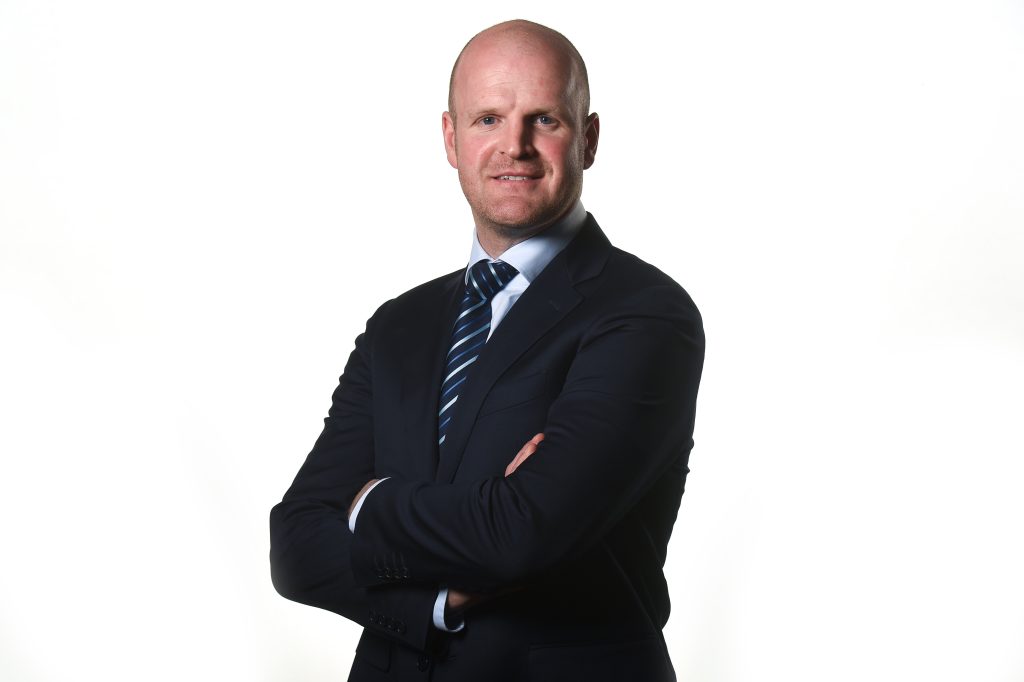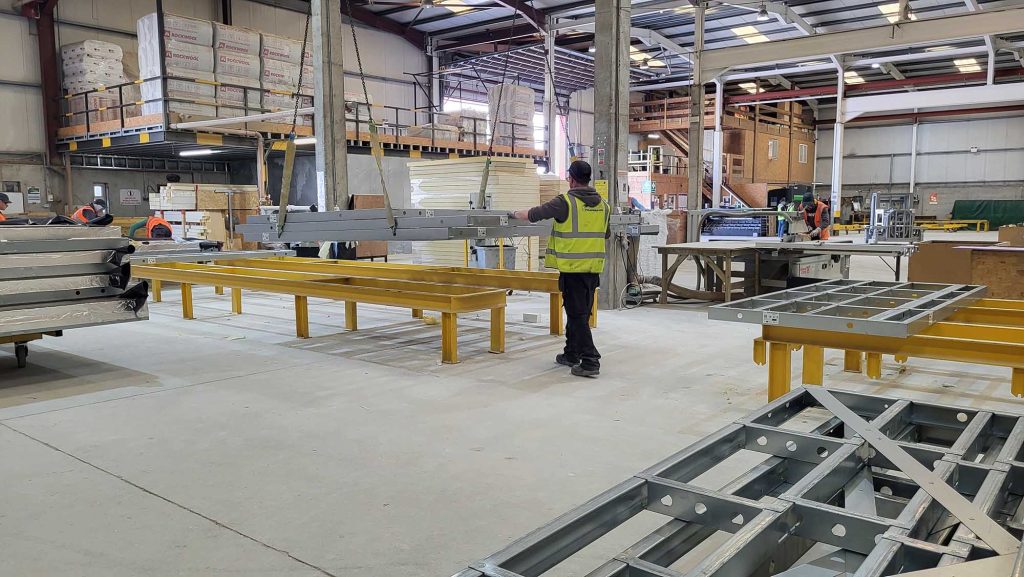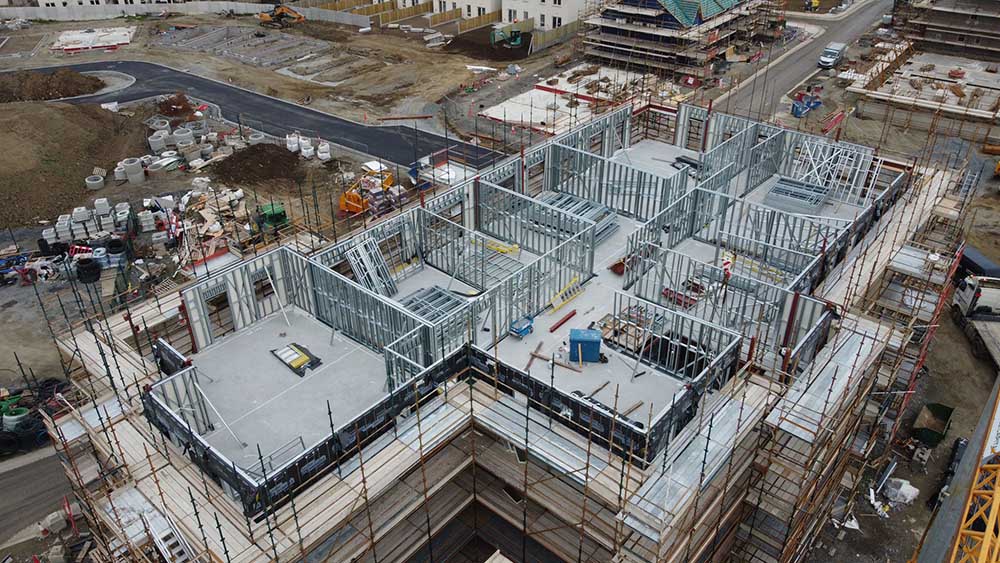“Learnings from Ireland’s growing MMC sector”

From brilliant manoeuvres on the pitch to smart plays on the manufacturing floor, former Monaghan football stalwart Dick Clerkin is a consummate strategist. The specialist management consultant discusses the changes needed for Irish offsite manufacturers to achieve their full potential.
Dick Clerkin and his associates at Clerkin Consulting work with clients in the construction products manufacturing and modern methods of construction (MMC) industries, driving productivity, profitability and sustainability improvements. He believes that when it comes to identifying the cause – or indeed causes – of profit or productivity losses within an MMC business, people tend to be both the problem and the solution.
Dick Clerkin, Clerkin Consulting
Over a 21-year career, with a background in process engineering and an MSc in Business and Management, Clerkin has worked with many leading brands in the construction products manufacturing and MCC industries across Ireland and the UK. Having faced recurring productivity challenges, he and his team have developed a number of effective frameworks that can first identify and then drive sustainable improvements in their clients’ businesses.
“We are finding a common trend of problems that in one way is good because it allows us to quickly identify them,” Dick Clerkin comments. “We don’t have to spend needless time and potential costs doing lengthy diagnostics. We can get in quickly and have a good sense of what will get a quick return. It is about quickly identifying the main constraints in their operations. Very often, it doesn’t require a huge amount of investment; but it does require a change in mindset. Traditional thinking is not going to win in the emerging MMC sector.”
The transition from traditional construction to offsite manufacturing and other MMC is relatively new. It is still very much an emerging industry in Ireland, so even the leaders are learning as they grow.
“Everyone is talking about digitalisation, industrialisation, robotics, all the hot topics,” he continues. “But the reality on the ground is that most companies are failing to optimise their business with the assets and resources they already have. There can be many reasons for this, but it generally comes back to the people. From the leadership team and frontline management right through to operatives on the shop floor people, if people are not working at the best level they can, there is an opportunity to unlock a quick upturn in the business of anywhere between 15 to 20% productivity just by getting people working better or working smarter. Again, that doesn’t require a huge level of investment. But it does require a commitment from the senior leaders to recognise the value of their people.”
People are assets, not commodities
Dick Clerkin believes that one of the biggest challenges is facility owners not necessarily seeing their people as assets. In his experience, people are sometimes seen as commodities, causing facility operators to rely too heavily on agency workers to scale up or down the workforce as and when needed.
However, he argues that, unlike more established industries, these MMC businesses are simply not mature enough, nor do they have the established and stable systems and processes in place to bring people in or to lose people, with such regularity, without a significant impact on productivity.
He is adamant that the delivery of offsite and other MMC outputs is not low-skilled work; it requires semi-skilled or skilled/trained people. “This thinking is important to reducing the currently high level of turnover at shopfloor level, which results in huge losses for a business and gives rise to quality control issues.”

Robust onboarding
As the industry is well aware, quality defects have a massive cost on a business. Unlike traditional manufacturing, delivering commodity-type small units, MMC facilities are making large, expensive frames and pieces/packs, so the cost of on-site reworks required due to quality issues can be excessive and very often can eliminate the margin out of a complete job.
“Too many companies are only slowly starting to realise the importance of having stable, well-trained teams in place, and then committing to their future through more robust onboarding, training and development, proper remuneration, with better frontline management on the shop floor. Committing to your people is to invest in them in much the same way a company might invest in a new factory or automation. Investing in your people and the systems to train and retain them is critical for the industry. The companies we have seen do this unlock good, quick returns in terms of productivity and overall profitability.”
He emphasises the need for a good onboarding or induction process. “Every facility needs to have a good frontline manager to guide new team members and to ensure they have the necessary tools and training on the standard operating procedure, delivered clearly and concisely, through multiple languages, where appropriate.
Clerkin cites a company’s inability to communicate with new hires as a significant barrier. He surmises that this is a symptom of the early stage of maturity of Ireland’s offsite manufacturing sector. “Most MMC companies are not yet at this level. They are deeply focused on their product, which is understandable. So, while they have the capacity to make a really good product, they may not have the stable systems and structures in place to do it repeatedly to a consistently high level of quality and at scale.”
More than just an emergency response
Dick Clerkin says that MMC in Ireland is facing an identity crisis right now in the eyes of the end-user or buyers.
He explains, “It is seen as a solution that can be rapidly rolled out for temporary housing in response to the refugee housing shortage and to the broader homeless crisis, which gives the impression that it is a lower-quality product when the very opposite is true.”
So, does offsite manufacturing automatically lead to better buildings?
He continues, “That depends on what you assign value to. If it is better because you can make it and install it on-site in less time and at less cost, then it’s better because MMC can do that.
“It is also sustainable in terms of energy efficiency, from production right through to building performance over its lifetime.
“While some people value more traditionally built buildings, that is their perspective. It is naïve for anyone involved in MMC to think they can shout down traditional methods to lift the profile of their own product or system.
“The reality is that the future will see a combination of building solutions in the marketplace, all sharing a common goal. All indicators point towards construction demand significantly outstripping what traditional build methods can deliver. So, MMC simply has to grow its market share in order to meet society’s growing needs. At the end of the day, value should be judged and experienced by the client and by the end user. MMC can deliver safe and sustainable buildings at scale, and I believe this is an outstanding proposition.”

Two worlds colliding
Reflecting on his everyday work, Dick Clerkin paints a picture of two worlds colliding; the traditional construction industry made up of people and leaders who have been in that game for a long time, and on the other side, manufacturing.
“Offsite and other MMC products represent a meeting in the middle. Bringing these two distinct worlds, or industries, together brings a necessary element of conflict – healthy tension.
“For many projects, there is a traditional procurer who might not fully understand benefits and key frameworks that manufacturing can deliver, or, equally, people who are coming from a solid manufacturing background might not understand or appreciate the nuances of construction.
According to Clerkin, “For MMC to thrive, there needs to be a meeting in the middle. For example, when we, as consultants, go into an established manufacturing facility, there are robust frameworks to enable benchmarking based on a number of KPIs and triggers across a number of areas of the business. Our associates can put it on a sliding scale, whereby the performance generally tallies with that across health and safety.
“In MMC facilities, particularly those only recently established, their compliance systems and standards with respect to health and safety, and quality would often be towards the lower end of that scale when benchmarked against manufacturing best practices. What can be referred to as an ‘agricultural’ approach to health and safety, stemming from the prevailing onsite construction culture, is not sustainable in a factory environment.
“The same can be said for quality, as the cost of retrofit and repairs on site can be significant in MMC. These are often under-appreciated risks. In my experience, a safe plant is an efficient plant. A safe working environment is more likely to be well organised and well laid out in terms of equipment locations, flow, materials, and vehicle-pedestrian interaction, along with a more engaged and committed workforce who recognise the efforts and investment being made towards their well-being.”
Knowing the real costs
He adds, “Another indicator of sector maturity is how well MMC operators know their numbers. Too often, we find that operators have no idea how much it costs them to make a frame or to make a finished pack. They know the individual price of the components and raw materials and their selling price to the customer, but very often, they lack the cost measurement and tracking systems during the manufacturing and dispatch phases. They don’t know in real-time how much they are spending on labour, materials, machinery, energy, etc, to ensure that they maintain a healthy margin for their output. This is a key challenge that we are helping our clients in the sector address.”
Shared challenges
In recent weeks, the government acknowledged a shortfall in housing exceeding a quarter of a million homes, and the only solution is to build more homes. The traditional construction industry does not have the capacity to ramp up delivery by 250,000+. Clerkin points out that MMC has a critical and, frankly, urgent role to play in addressing this challenge.
“This is a huge opportunity for the sector,” he explains. “But there are many shared challenges and obstacles to MMC delivery at scale. Overcoming these obstacles will require public sector intervention and a mindset shift by the private sector.
“The state needs to figure out how to support the people, the businesses, and the institutions that can deliver housing. There is work to be done on the funding models to ensure the viability of building. One of the big risks that MMC has over traditional construction sites is the capital cost. So, that’s the capital cost of the facility, cost of equipment, cranage, forklifts, automated lanes, and pre-bought raw materials such as steel coils and or timber, insulations etc. Both primary contractors and State agencies need to solve that problem because MMC companies will struggle to sustain that level of cost and risk alone.”
Keeping the MMC pipeline flowing and growing
A recently published study in the UK highlighted the number of MMC companies that have gone out of business due to their inability to withstand such losses without a secure pipeline of work and a more sustainable funding model.
Dick Clerkin cites the example of an Irish MMC manufacturing client with a full order book that achieved 20% productivity through efficiency measures they implemented.
“That additional capacity was then built into the company’s commercial forecasts, which led to a significant order with a large home builder. Due to market and price volatility, this large client pushed out site delivery schedules by six months. This left a hole in the factory’s order book that couldn’t be filled in the short term, with plant, equipment and labour costs all needing to be maintained throughout. While in the traditional construction world, a contractor could take the team off-site and not buy the building materials until needed, the offsite construction manufacturer incurs the cost in terms of their reduced factory output levels. This is not just a problem for the facility operator, in real terms, this is a problem for the entire industry and the broader economy. MMC operators cannot be left to shoulder this burden. State policies and private sector project owners need to educate themselves on the realities of MMC delivery and work towards a marketplace with sustainable and reliable pipelines.
“Private entities will build when it is most profitable to do so, and that is their responsibility to shareholders. The state does not have the same modus operandi, and it can play a huge role in ensuring a steady pipeline of projects for MMC suppliers to both invest towards and successfully deliver. Doing so will both lift and sustain our overall house-building capacity this country urgently requires to meet the needs of its growing population.”
In conclusion
Ireland’s MMC sector is still an emerging industry and, as such, is facing various challenges, from a lack of investment in people to funding models and sustainable pipelines. However, according to Dick Clerkin, there is hope.
“As more players enter the market, there is an opportunity to learn from each other and to share best practices. The key to success lies in recognising the value of people, investing in stable systems, and committing to their future.
“With a mindset shift, public sector intervention, and private sector support, MMC can deliver safe, sustainable, and cost-effective buildings at scale. Let us redraw the blueprint for the factory, keep the MMC pipeline flowing and growing, and build the homes that Ireland urgently needs,” Dick Clerkin concludes.




